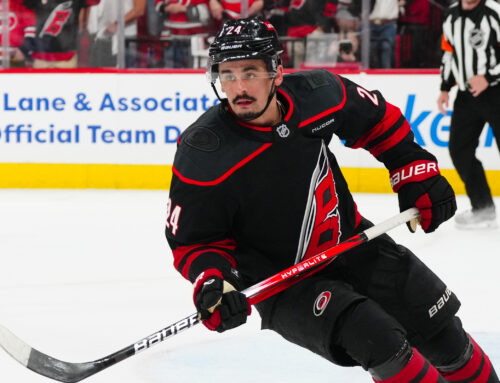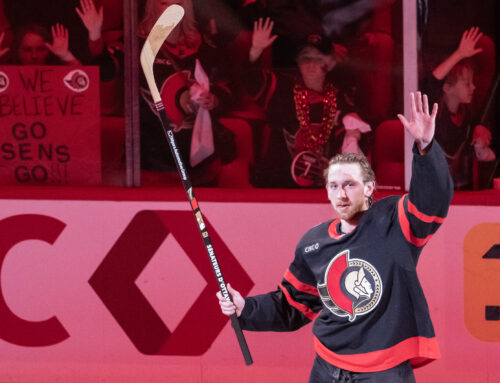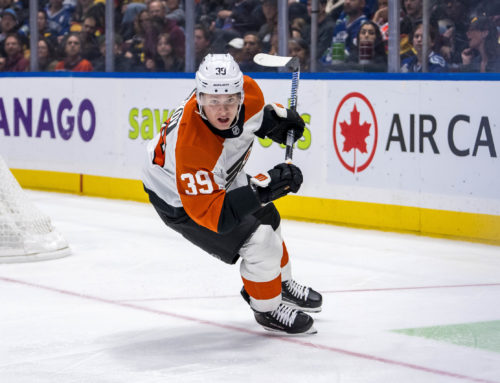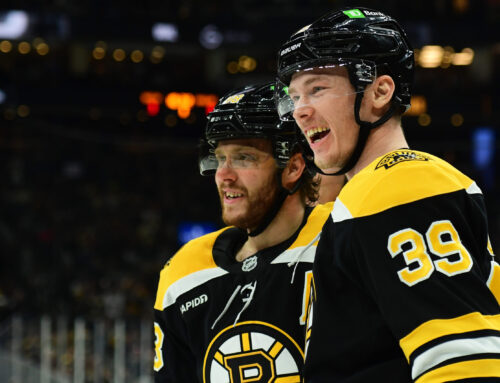Hey there! You look like a diligent and intelligent individual. Only the most elite general managers consume fantasy hockey in early-August. Are you looking to step up your game even further? Do you want to reach new levels of fantasy hockey dominance? If so, click here to secure your copy of Dobber’s 2022-2023 Fantasy Guide. Looking for point projections? We got ’em! Breakout candidates? We got ’em! Line combinations? You betcha! Everything you need to win your league in one handy dandy handbook!
This week's Eastern Edge will continue a discussion we began last week, focusing on players who had strong second-half performances last season. A strong second-half performance sometimes gets lost when we analyze a player's season-long output. However, if the conditions in which they thrived over a small sample are likely to be available again this year, then there's reason to be optimistic about their fantasy outlook. On the flip side, if the factors behind their second-half surge are difficult to replicate, then perhaps you should steer clear of them this season. Without further ado, here are a few more players who ended last season on a high note…
Nico Hischier
Last year, New Jersey's captain finished with an impressive 60 points in 70 appearances, which translates to 70 points over 82 games. It was a significant step forward for Hischier, who mostly flirted with a 50-point pace in his first four seasons. Despite last year's progression, public perception of Hischier hasn't changed very much. It seems his breakout was overshadowed by breakouts of greater magnitude in New Jersey, from Jack Hughes and Jesper Bratt. In addition, since Hischier missed time due to injury last year, he didn't get to finish with a high point total. Many will see he finished with 60 points and fail to recognize that he was on pace for 70. A closer look reveals that after starting the year with 24 points in 35 games (56-point pace), he closed out the campaign with 36 points in his final 35 outings (84-point pace). There wasn't a huge difference between Hischier's role in the first and second half of last year, so it's not like he saw more favourable conditions that are unlikely to be available this season. If anything, I'm even more optimistic because the team around him is primed to take another step forward. The Devils had a bottom-five power-play last year, scoring on just 15.6-percent of their chances. They have the talent to score at a much better rate this season, and more power-play production would certainly help Hischier's point total.
Nick Suzuki
Before we start talking about Suzuki, I think it's important to state that much of what I'm saying here also applies to his partner in crime, Cole Caufield. One important caveat is that Caufield received much more media attention for his second half surge than Suzuki did for his. As a result, Caufield's fantasy value has risen to a greater extent than Suzuki's. That's why I've chosen to discuss Suzuki here; because I think he's more likely to be undervalued in fantasy drafts than Caufield is.
The impact that coach Martin St. Louis had on the Canadiens last year has been well-documented. After looking listless under former coach Dominique Ducharme during the first half, the Habs seemed like a more cohesive unit once St. Louis took over. Individual performances improved drastically, and Suzuki was no exception. After tallying 27 points in 45 games (49-point pace) under Ducharme, Suzuki exploded with 34 points in 37 games (75-point pace) under St. Louis. He's far and away the best center on a rebuilding team, so he'll get every opportunity to produce and succeed. On contract for the next eight years, he's a key piece of the future in Montreal and his continued development into a star is a top priority for the Canadiens.
Jake DeBrusk
After a disappointing 2020-2021 campaign that saw him score at a career-worst 28-point pace, DeBrusk rebounded with 42 points in 77 outings last year – marking the fourth time in five seasons that he's scored at a 45–50-point pace. Now that he's 25 years old, and has settled into a relatively consistent scoring pattern, it's tempting to conclude that the player he's been so far is the player that he's going to be going forward. Although that may be the case, I'm still in the camp that believes he has some untapped potential, because he hasn't really experienced a sustained stretch of favourable deployment. Over the past two seasons, he's averaged just 15 minutes per game, seeing some – but not a lot of exposure to the team's star forwards. Last season, he spent a lot of time beside Patrice Bergeron and Brad Marchand down the stretch, which is part of the reason why he was so productive during the second half, tallying 27 points in his final 34 games (65-point pace). Now, Brad Marchand is expected to miss the first two months of the campaign while recovering from hip surgery. Although DeBrusk won't have the luxury of playing with Marchand early in the year, he should see a much greater role out of the gate, to fill the void created by Marchand's absence. That could very well include a role on the top power-play unit, which has eluded DeBrusk in recent seasons. DeBrusk reportedly didn't get along with former coach Bruce Cassidy, so perhaps a new voice from new coach Jim Montgomery can help DeBrusk take a step forward this year.





 FLA
FLA EDM
EDM CHI
CHI N.J
N.J BUF
BUF WSH
WSH S.J
S.J UTA
UTA MIN
MIN
